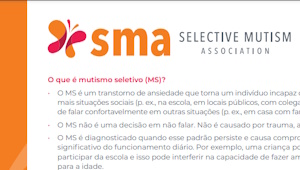Online Library
What Is Selective Mutism?
Learn what selective mutism is, its signs and symptoms, and more
What is Selective Mutism?
Selective Mutism (SM) is an anxiety disorder characterized by an individual’s inability to speak in one or more social settings (e.g., at school, in public places, with peers) despite the ability to speak comfortably in other settings (e.g., at home with immediate family). SM is diagnosed when this pattern is persistent over time and causes significant impairment in daily functioning (e.g., making it difficult for a child to effectively participate in school, interfering with the ability to make age-appropriate friendships).
What are the signs and symptoms of SM?
Individuals with SM typically are able to speak freely in situations in which they are comfortable; thus, the discrepancy between age-appropriate speech at home and markedly reduced or completely absent speech in anxiety-producing social situations is a hallmark feature of SM. In addition, when anxious, individuals with SM may struggle to make eye contact and often present as behaviorally inhibited. They may rely on pointing, nodding, writing, and other forms of non-verbal communication to answer questions. It is also common for individuals with SM to “speak through” a trusted individual (e.g., whispering an answer to a question to a parent or “buddy” at school). SM often co-occurs with other forms of anxiety, particularly social anxiety.
Who is impacted by SM? How common is it?
SM typically emerges in early childhood, with an average age of onset of 5 years, though may not be identified until a child starts school. Though it is less common, in some individuals, SM can persist until adolescence or even adulthood. Several studies examining the prevalence of SM suggest that it impacts about 0.7% (approximately 1 in 140) of school-aged children. It is slightly more common among girls than boys. It is more common in multilingual youth.
How is SM diagnosed and treated?
Professionals in many fields including clinical psychologists, clinical social workers, and speech-language pathologists may have expertise in diagnosing and treating SM. Many research studies have been conducted, and behavioral and cognitive-behavioral therapy strategies have been identified as the most effective interventions for SM. In addition, for some individuals, treatment with medication may be helpful.




